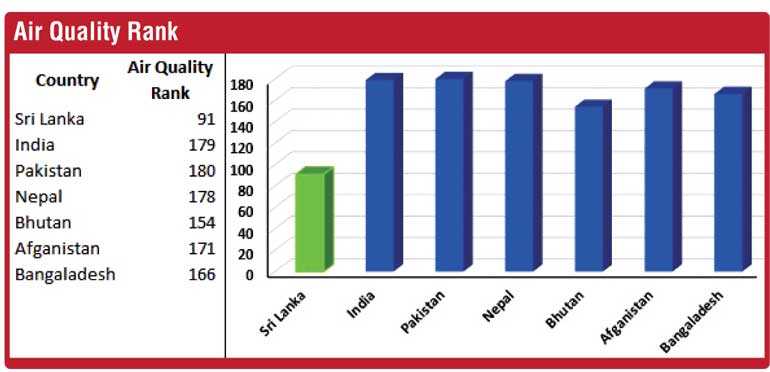Wednesday Feb 18, 2026
Wednesday Feb 18, 2026
Tuesday, 15 September 2020 00:03 - - {{hitsCtrl.values.hits}}

Sri Lanka ranked high, out-performing South Asian neighbours, in its Air Quality measurement according to the Environmental Performance Index 2020 (EPI) released by researchers at Yale and Columbia universities recently.
The prestigious index, now in its 22nd year, has become the premier metrics framework for global environmental policy analysis, ranking 180 countries on several performance indicators across a range of issue categories covering environmental health and ecosystem vitality.
Based on peer comparisons, overall Sri Lanka is ranked 109th in with an EPI score of 39 out of 100, ahead when compared with its South Asian counterparts.
The Air Quality issue category measures the direct impacts of air pollution on human health in each country. It consists of three indicators: PM2.5 exposure, household solid fuels, and ozone exposure.
Sri Lanka is ranked 91 in Air Quality according to the 2020 EPI, importantly the country has over a 10-year period continued to demonstrate a positive growth when compared to the region.
In contrast, other South Asian nations lagged behind in Air Quality, notably with Bangladesh ranked 166, India 179 and Pakistan 180, resulting in millions of people suffering from dangerous levels of air pollution.
Sri Lanka’s favourable Air Quality and strong performance may be attributed due to Vehicle Emission Testing program. Following a Supreme Court decision to increase air quality levels, the program to ensure mandatory testing commenced in 2008 with two companies, CleanCo Lanka Ltd. and Laughs Eco Sri Ltd. chosen to test vehicles and issue vehicle emission certificates.
To date, Sri Lanka’s vehicle emission testing program has proven to be an effective mechanism to detect high emitting vehicles and play a vital role in improving air quality especially in urban areas. Despite vehicle population numbering over 5.6 million including motor cycles, three wheelers and personal vehicles, total emissions have remained stagnant contributing to preserving the nation’s ambient air quality and a high score in the 2020 EPI Air Quality category.
Better air quality has also contributed to fewer air pollution-related illnesses and other health effects when compared to countries in the region.
Despite these positives, more work remains to be done for Sri Lanka to ascend the ranks of having cleaner air.
Significant initiatives that are necessary include creating awareness among the public on the effects of vehicle emissions, the use of fuel which are not recommended by manufacturers, inculcating a proactive attitude among vehicle owners on the importance and benefits of vehicle maintenance on an ongoing basis, ensure regular monitoring of mechanical condition of vehicles for better fuel efficiency and conducting studies and implementing changes in driving patterns and traffic can contribute to further erosion of Sri Lanka’s air quality.
Overall, Sri Lanka’s vehicle emission testing program has yielded positive results not only in the nation’s Air Quality score but has also helped to focus on a wide spectrum of sustainability issues.